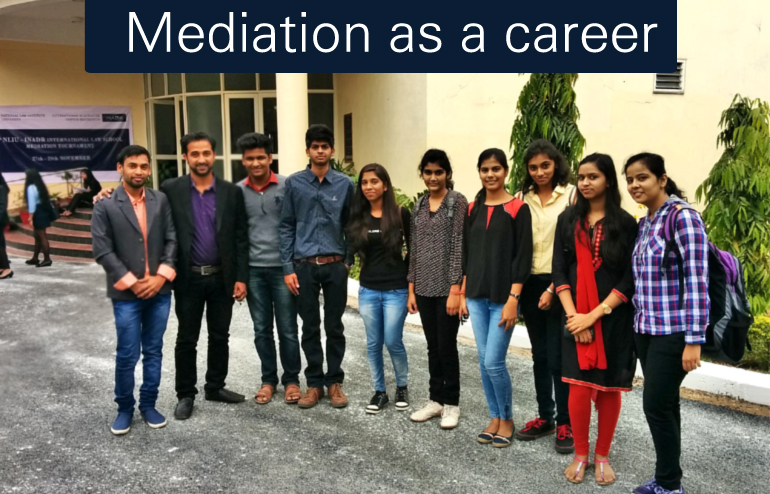A business dispute is a business illness. If mild, you can work through it, but it still drags you down and impacts profits. If severe, a business dispute can destroy an entire business. Unfortunately, just as illnesses are an inevitable part of human life, disputes are an inevitable part of business. Learning how to effectively manage the disputes is critical for business success. Mediation has become a way out. For laymen, often the term is confused with meditation. Mediation amongst Lawmen is a rising trend and is often sought as a more hassle free dispute resolution module. One often “mediation” in connected with resolution of disputes which have already become lawsuits, and, occasionally, before those lawsuits are filed. Mediation is a process by which a neutral third party called a Mediator hears a dispute between two or more parties and attempts to help the parties settle their disputes without judging the merits of the case. Few days back NLIU, Bhopal hosted the INADR International Mediation competition, which was also attended by few students from LST Bhopal. Few selected students who were taken to the campus post a selection process, a rigorous quiz on current affairs was conducted.
Being a Law aspirant, it’s also good for you to know the nitty gritty of those things which are becoming more important in a law student’s life than litigation and also has all the charm of a corporate lawyer.
Who can become a Mediator?
Mediators range in training from practicing attorneys, retired judges or other professionals to highly trained mediators who work full or part time in the specialized field of mediation. The right mediator for your case is the one who demonstrates overriding neutrality in evaluating and resolving your case. The effective mediator will help the parties recognize the strengths and weaknesses of both sides’ case, so that at the end of mediation both parties are reasonably satisfied with the outcome. The effective mediator will also help parties consider the risks and costs of resolving a dispute before a judge or jury, without necessarily meeting the expectations of either party.
How the Mediation begins? Can a court compel a party to begin mediation?
If you have a dispute with another person or business, which you want to be resolved, you can first propose to the other side to mediate the case. If you are uncomfortable with that option, then you can make the first call to the mediator and ask the mediator to approach the other side with the invitation to mediate. A well-trained mediator can effectively maintain his or her neutrality during this process. If you are not familiar with any mediators, you can call the local court and ask for potential mediators, or you can call your local bar association which often has a panel of mediators. Other possible sources are the Internet, as well as private mediation companies. In some cases, contracts between the parties require that a case be mediated and/or arbitrated. This often occurs in medical malpractice actions, construction contracts, sale and purchase agreements, cases involving marital discord, real estate purchase agreement etc. In some cases, statutes require pre-litigation mediation or alternative dispute resolution, such as in most types of corporate disputes involving goodwill at stake. The excessive backlog in court calendars makes mediation an attractive alternative in other types of cases, resulting in the resolution of disputes in a timely manner, and avoiding the painstaking experience of costly litigation lasting up to five years.
What if the mediation fails?
In most states, what takes place in mediation is confidential. For example, the mediators cannot be forced to testify at trial as to what was said in a mediation hearing, they are immune from it under the agreement they sign before entering into the mediation. Any offers made during the mediation process, and any concessions made, are confidential if the case doesn’t settle.
The parties can surely resort to courts if mediation falls and are immune from the rule of Res Judicata (legal term a law aspirant should know, Go and learn if you don’t know)
Hence, as discussed above, sometimes litigation can be your best option and mediation offers no real benefits in circumstances where the issue involved is grave and the parties don’t agree to. In such case, the parties are advised not to waste time and money mediating. In other cases, Mediation is the best option where the parties seek to resolve the dispute without delay and keep the relation between them prospectively healthy. Again, smart clients always consult a business lawyer skilled at dispute resolution in helping you analyze your options rather than trying this themselves before filing suits.
Hope you have a good experience reading about things you may do in future!
Happy CLATting
Yours truly
Amicus






















































do my paper for college
…Feb 7, 2014 welcome those who ask us, Will you help me to write a paper for me college. When you ask us, ‘Will you write my paper for me cheap?…
It was really very motivating really knowing about what are you going to get in future and experiencing it is really commendable and it really motivated us to do more and more in our preparation and it really helped
first of all,thank you very much deepu sir for giving me this golden opportunity to spectator INADR,i learned a lot from this visit,how to become a good student,i learnt competition can actually be a healthy way to work effectively,set smart goal,make an action plan,stick with it.